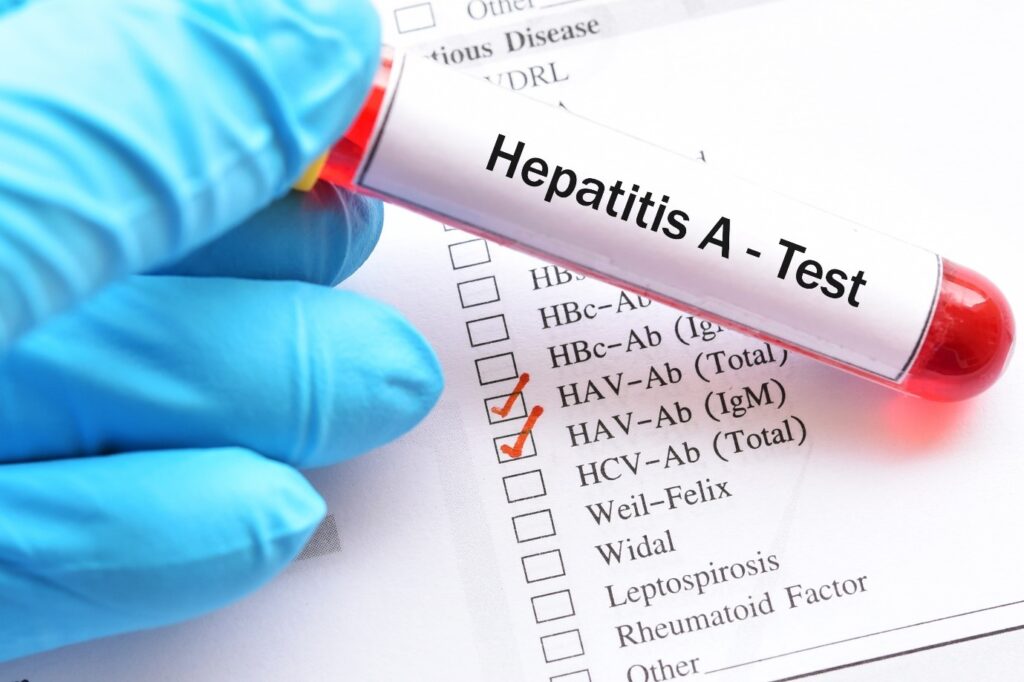Hepatitis A is a liver-affecting virus primarily transmitted through contaminated food and water.
If you suspect you’ve been exposed to the virus or are showing symptoms, timely testing is crucial for your health.
Why Is Hepatitis A Testing Important?
Testing for hepatitis A is essential for several reasons:
- Confirm Symptoms: If you experience symptoms such as jaundice (yellowing of the skin or eyes), dark urine, fatigue, or abdominal pain, a test can determine if hepatitis A is the underlying cause.
- To Check for Exposure: If you’ve had contact with someone diagnosed with hepatitis A or have travelled to areas where the virus is prevalent, testing can indicate if you’ve contracted the virus.
- To Prevent Spread: Knowing your hepatitis A status helps prevent the virus from spreading to others, ensuring you receive the appropriate care.
How Is Hepatitis A Testing Conducted?
Testing for hepatitis A is straightforward and involves the following steps:
- Blood Sample: A healthcare professional will take a small blood sample from your arm. This process is quick and typically causes minimal discomfort.
- Laboratory Testing: The blood sample is sent to a lab for analysis to detect antibodies associated with the hepatitis A virus.
What are the Types of Hepatitis A Tests?
There are two primary tests used to assess hepatitis A:
Hepatitis A Antibody Test (Anti-HAV Test):
- IgM Antibodies: This test detects IgM antibodies that appear in your blood shortly after infection. A positive result indicates a current or recent hepatitis A infection.
- IgG Antibodies: This test identifies IgG antibodies, which develop later. A positive result indicates previous infection or vaccination, suggesting immunity to the virus.
Hepatitis A RNA Test: This test looks for the virus in your blood.
While not commonly used, it may be helpful in specific cases or research settings.
What does the Test Results Indicate?
Here’s what your test results may indicate:
Positive IgM Test: Suggests you have a current or recent hepatitis A infection and may be experiencing symptoms.
Positive IgG Test: Indicates a past hepatitis A infection or successful vaccination, meaning you are likely immune.
Negative Results: Suggest that you have not been infected or that it’s too early for the virus to be detectable. If you have symptoms but test negative, further testing may be necessary.
Next Steps After Testing
If your test results confirm hepatitis A, your doctor will advise on the following:
- Managing Symptoms: Guidance on alleviating symptoms and supporting liver recovery will be provided.
- Preventing Spread: You will receive instructions on how to avoid spreading the virus to others.
- Follow-Up Care: Regular check-ups may be necessary to monitor your liver health and recovery progress.
How is Hepatitis A Prevented?
To reduce your risk of hepatitis A or manage the virus effectively:
- Practice Good Hygiene: Wash your hands thoroughly, especially after using the restroom and before meals.
- Consume Safe Food and Water: To avoid contamination, ensure that what you eat and drink comes from trusted sources.
- Inform Close Contacts: Let people you’ve been around know so they can get tested and take necessary precautions.
Hepatitis A testing is vital for diagnosing the virus and managing your health effectively. By understanding the testing process and interpreting your results, you can take the proper steps toward recovery and protect those around you.
If you think you may have been exposed to hepatitis A, contact Assure Diagnostics today for expert testing and guidance! Take control of your health and book your appointment now!

